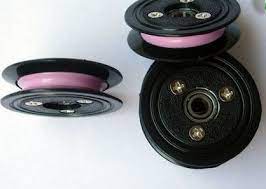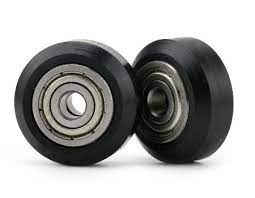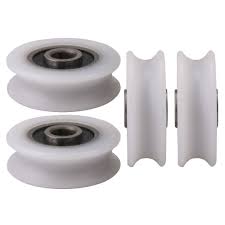Product Description
|
Brand |
Proway(OEM) |
|
Shipping |
Via air freight, By sea or by FedEx/DHL/TNT/UPS/EMS/Express |
|
Port of Shipment |
FOB NingBo, ZheJiang ,Fastest shipping or the port closest to your country |
|
Support Custom Logo |
YES |
|
Packing |
1pc/opp bag/Safe carton packaging (Also can be customized according to your requirements) |
|
Sample |
Return the original way after placing the order |
|
Lead Time |
3~7 days for in stock |
|
5~15 days for custom |
|
|
Customize Service |
We provide customizing service including LOGO printing, sticker,packaging design etc even for orders of small qty |
|
More Details |
Pls send us enquirys directly! |
Proway Sliding Shower Window Plastic Roller, Bathroom Glass Door Wheel, Shower Door Pulley (HL-603)
Q1:Why choose us?
A1: We have professional team of workers, service and inspection, and we have own sub factories.
Q2:Can I get samples?A2:Sure, we can send the samples for free, but customer should pay the freight cost. It will cost some sample charge for custom desighs, but it is refundable when order is up to certain quantity.
Q3:How to pay?
A3: Usually you should pay 30% deposit before production, the balance paid before shipping. For rhe small order, you need to pay the whole payment before production.
Q4:Do you offer customized packaging?
A4:Yes. All of our products can be packed as your requirement.
Q5: How long can you usually deliver?
A5:7-15 days if in stock. Q6: Do you offer OEM service? A6:Yes ( MOQ required )
Q6: Why your price is higher than other suppliers ?
A6: Different products has different price, although the same product which use different fabric and workmanship will have different price, as suppliers, we promise to provide the best pre-sales and after-sales service for the customers!
Q7: Can you give me a discount?
A7: We mainly do wholesale service, our policy is that bigger quantity,cheaper price, so we will quote you the best price based on your order quantity.
| After-sales Service: | 1 Year |
|---|---|
| Warranty: | 1 Year |
| Certification: | TUV, CE, ISO |
| Samples: |
US$ 10/Piece
1 Piece(Min.Order) | Order Sample |
|---|
| Customization: |
Available
| Customized Request |
|---|
.shipping-cost-tm .tm-status-off{background: none;padding:0;color: #1470cc}
|
Shipping Cost:
Estimated freight per unit. |
about shipping cost and estimated delivery time. |
|---|
| Payment Method: |
|
|---|---|
|
Initial Payment Full Payment |
| Currency: | US$ |
|---|
| Return&refunds: | You can apply for a refund up to 30 days after receipt of the products. |
|---|
Are there any limitations or temperature constraints with plastic pulleys?
Yes, there are certain limitations and temperature constraints associated with plastic pulleys. Here’s a detailed explanation:
1. Load Capacity:
Plastic pulleys have a limited load capacity compared to their metal counterparts. While they are suitable for many light to moderate load applications, they may not be suitable for heavy-duty or high-load scenarios. Exceeding the recommended load capacity of plastic pulleys can lead to deformation, premature wear, or failure of the pulley, compromising the overall performance and reliability of the system.
2. Temperature Sensitivity:
Plastic pulleys can be sensitive to temperature variations. Extreme heat or cold can affect the mechanical properties of the plastic material, leading to dimensional changes, reduced strength, or increased brittleness. High temperatures can cause the pulleys to deform or soften, while low temperatures can make them more prone to cracking or breakage. Therefore, it is important to consider the temperature range in which plastic pulleys will be operating and choose materials that can withstand the specific environmental conditions.
3. Thermal Expansion:
Plastic pulleys can exhibit thermal expansion, meaning they may expand or contract with changes in temperature. This can affect the precision and alignment of the pulley system. In applications where precise positioning or tight tolerances are required, thermal expansion of the plastic pulleys should be taken into account to ensure proper functioning of the system. Compensation techniques, such as using adjustable mounting brackets or incorporating thermal expansion calculations, may be necessary to maintain alignment under varying temperature conditions.
4. Chemical Compatibility:
Some plastic materials used in pulleys may not be compatible with certain chemicals or solvents. Exposure to chemicals that are incompatible with the plastic material can lead to degradation, discoloration, or weakening of the pulleys. It is important to consider the chemical environment in which the plastic pulleys will be used and select materials that are resistant to the specific chemicals present in that environment.
5. UV and Weather Resistance:
Not all plastic materials used in pulleys have excellent resistance to ultraviolet (UV) radiation or outdoor weather conditions. Prolonged exposure to sunlight or harsh weather elements can cause degradation, discoloration, or loss of mechanical properties in certain plastics. If plastic pulleys are intended for outdoor or UV-exposed applications, it is crucial to choose materials that are UV-resistant and weather-resistant to ensure long-term durability and performance.
6. Static Electricity:
Some plastic pulleys can generate static electricity during operation. This can be a concern in certain applications where static discharge can interfere with sensitive electronic components or create safety hazards in potentially explosive environments. In such cases, anti-static or conductive plastic materials may need to be used to mitigate the risks associated with static electricity generation.
In summary, plastic pulleys have limitations and temperature constraints that should be considered during their selection and application. These limitations include load capacity, temperature sensitivity, thermal expansion, chemical compatibility, UV and weather resistance, and static electricity generation. By understanding and addressing these constraints, it is possible to use plastic pulleys effectively and ensure their optimal performance and longevity in various mechanical systems.
Can plastic pulleys be customized for specific machinery and equipment?
Yes, plastic pulleys can be customized to meet the specific requirements of machinery and equipment. Here’s a detailed explanation:
Plastic pulleys offer a high degree of design flexibility, allowing for customization to match the needs of different machinery and equipment. Here are some key points regarding the customization of plastic pulleys:
1. Material Selection:
Plastic pulleys can be manufactured using various types of plastics, such as nylon, polyethylene, acetal (POM), or polyurethane. The choice of material depends on the specific application requirements, including factors like load capacity, wear resistance, chemical resistance, temperature tolerance, and desired friction properties. Different materials can be selected to optimize the performance and durability of the pulley in the given machinery or equipment.
2. Shape and Size:
The shape and size of plastic pulleys can be customized to fit the available space and interface with other components in the machinery or equipment. Manufacturers can design pulleys with specific dimensions, such as diameter, width, and bore size, to ensure proper alignment, belt or chain engagement, and tension. Customized shapes can include flanges, grooves, or other features that facilitate efficient power transmission and enhance the overall functionality of the machinery or equipment.
3. Mounting Options:
Plastic pulleys can be customized with different mounting options to suit the specific requirements of machinery or equipment. Mounting options can include bores, keyways, set screws, or other mechanisms that enable secure attachment to shafts or other rotating components. Customized mounting options ensure proper installation and alignment of the pulleys, contributing to reliable and efficient operation.
4. Groove Configuration:
In belt-driven systems, plastic pulleys can be customized with different groove configurations to accommodate specific belt profiles. Pulleys can be designed with V-grooves, flat grooves, or multi-groove profiles, depending on the type of belt being used. Customized groove configurations ensure optimal belt engagement, tracking, and power transmission, minimizing slippage and maximizing efficiency in the machinery or equipment.
5. Surface Finish:
The surface finish of plastic pulleys can be customized to meet specific requirements. This includes factors such as roughness, texture, or the addition of coatings or treatments. For example, pulley surfaces can be polished or coated to reduce friction, improve wear resistance, or enhance corrosion resistance. Customized surface finishes help optimize the performance and longevity of plastic pulleys in the machinery or equipment.
6. Load Capacity and Reinforcement:
If the machinery or equipment operates under heavy loads or high-stress conditions, plastic pulleys can be customized to enhance their load-carrying capacity. Reinforcing elements, such as fibers or fillers, can be added to the plastic material to increase strength and improve overall durability. Customized reinforcement ensures that the plastic pulleys can withstand the specific loads and forces encountered in the machinery or equipment.
7. Application-Specific Requirements:
Plastic pulleys can be customized to meet application-specific requirements. For example, in food processing equipment, the pulleys may need to comply with specific hygiene standards, such as being made from food-grade materials that are easy to clean. In corrosive environments, the pulleys can be customized to exhibit enhanced chemical resistance. Customization allows plastic pulleys to be tailored to the unique demands of different machinery and equipment.
Overall, plastic pulleys can be customized in terms of material selection, shape and size, mounting options, groove configuration, surface finish, load capacity, and meeting application-specific requirements. This customization ensures that the plastic pulleys seamlessly integrate into the machinery or equipment, providing optimal performance, durability, and reliability in their intended applications.
Can you explain the key features and advantages of plastic pulleys?
Plastic pulleys offer several key features and advantages that make them suitable for various applications. Here’s a detailed explanation of the key features and advantages of plastic pulleys:
1. Lightweight:
One of the significant features of plastic pulleys is their lightweight construction. Compared to metal pulleys, plastic pulleys are considerably lighter, which can be advantageous in applications where weight reduction is desired. The lightweight nature of plastic pulleys makes them suitable for applications where minimizing overall system weight is important, such as in portable devices or equipment.
2. Corrosion Resistance:
Plastic pulleys are inherently resistant to corrosion. Unlike metal pulleys that may rust or corrode when exposed to moisture or certain chemicals, plastic pulleys maintain their integrity and functionality even in corrosive environments. This corrosion resistance makes plastic pulleys suitable for applications where exposure to moisture or chemicals is likely, such as in marine equipment or outdoor machinery.
3. Low Friction:
Plastic pulleys generally have low friction coefficients. This means that the contact between the pulley and the associated components, such as belts or ropes, is smoother, resulting in reduced frictional losses. The low friction properties of plastic pulleys contribute to improved efficiency and energy savings in various systems, such as conveyor belts, where reducing power consumption is desirable.
4. Noise Reduction:
Plastic pulleys offer inherent damping properties, which help reduce noise and vibration during operation. The damping effect of plastic materials absorbs vibrations and minimizes noise generation, resulting in quieter operation compared to metal pulleys. This makes plastic pulleys suitable for applications where noise reduction is important, such as in household appliances or office equipment.
5. Design Flexibility:
Plastic pulleys offer a high degree of design flexibility. They can be molded into various shapes, sizes, and configurations, allowing for precise customization. This flexibility in design enables specific features, such as flanges, grooves, or mounting options, to be incorporated directly into the pulley. Plastic pulleys can be tailored to meet the unique requirements of different applications, making them highly versatile in terms of design possibilities.
6. Cost-Effective:
Plastic pulleys are generally more cost-effective compared to pulleys made from other materials, such as metal, ceramic, or glass. The manufacturing process for plastic pulleys is typically less complex and less expensive, resulting in lower production costs. This cost advantage makes plastic pulleys a cost-effective choice for a wide range of applications, especially in situations where budget constraints are a consideration.
7. Electrical Insulation:
Plastic pulleys offer electrical insulation properties. Unlike metal pulleys that conduct electricity, plastic pulleys act as insulators, preventing the flow of electrical current. This electrical insulation characteristic is advantageous in applications where electrical conductivity needs to be avoided or isolated, such as in electronic devices or systems with sensitive electrical components.
8. Chemical Resistance:
Plastic pulleys exhibit resistance to various chemicals, depending on the specific plastic material used. They can withstand exposure to substances such as oils, fuels, solvents, and acids without degradation. This chemical resistance makes plastic pulleys suitable for applications where contact with chemicals or aggressive substances is expected, such as in industrial machinery or chemical processing equipment.
In summary, plastic pulleys offer key features and advantages including lightweight construction, corrosion resistance, low friction, noise reduction, design flexibility, cost-effectiveness, electrical insulation, and chemical resistance. These attributes make plastic pulleys suitable for a wide range of applications across industries such as automotive, consumer electronics, manufacturing, and more.
editor by CX
2023-11-29




